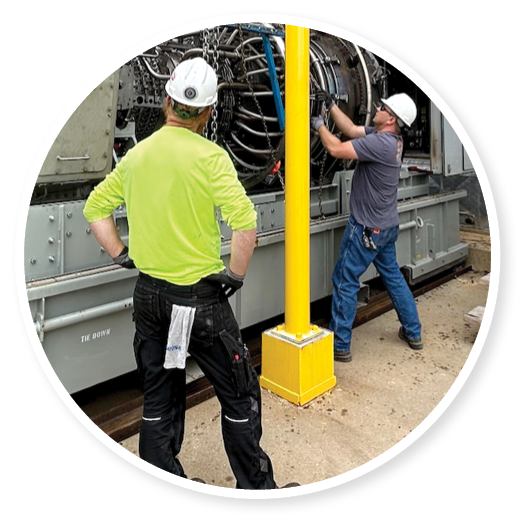25 Careers in 2025
Every time you flip a switch, you’re connected to a network of over six million energy professionals working behind the scenes to keep the power flowing. From engineers and lineworkers to communicators and IT specialists, public power is a diverse and essential industry. Careers in public power aren’t just impactful––they’re rewarding, with competitive pay often above national averages.
Ready to jump into a career in public power? Whether you’re just starting out and want to learn about the wide variety of energy careers available, or you’re ready to take the next step with job shadowing, paid internships or even submitting your resume, Missouri River Energy Services can help. We also offer a scholarship program for graduating high school students pursuing courses of study for careers related to the electric industry.
No matter where you are in your career path, we can help you discover all the possibilities that come with a career in public power.
Learn more about our careers at https://careers.mrenergy.com.
From engineers and lineworkers to communicators and IT specialists, public power is a diverse and essential industry.

SPOTLIGHT CAREER:
Facility Services
Ensuring Every First Impression is a Great One
From the parking lot to the power plant, every part of a public power utility depends on well-kept facilities. After all, you only get one chance to make a first impression.
Facility services assistants are the people who make that happen, blending hands-on maintenance skills with a commitment to safety and reliability. Their work often goes unnoticed, but without it, the rest of the operation would quickly come to a standstill.
What They Do
Facility services assistants are the quiet force that keeps public power operations running smoothly. From maintaining headquarters buildings and grounds to ensuring company vehicles are ready when needed, they handle a wide range of essential tasks. They perform landscaping, snow removal, janitorial work and general repairs, as well as support administrative projects and safety initiatives. When emergencies happen, they’re on call to respond, day or night, so that facilities stay functional and safe.
Why Their Work Matters
In public power, reliability starts long before electricity flows through the lines. It begins with well-maintained facilities and equipment. Facility services assistants protect the infrastructure that supports every department, ensuring teams have the clean, safe and efficient workspaces they need to serve communities. Their behind-the-scenes work helps prevent downtime, safeguards resources and supports the mission of delivering dependable, affordable power to customers. In short, they keep the lights on by keeping headquarters in top shape.

Risk Managers
Safeguarding Public Power’s Future
Risk managers are the guardians of stability in public power, ensuring financial integrity, operational efficiency and protection against unexpected challenges. By assessing risk, conducting audits and managing insurance programs, they help utilities make informed decisions that protect both the organization and the communities it serves.
What They Do
With a blend of financial expertise and strategic foresight, risk managers oversee programs that balance risk and resilience. They conduct internal audits to ensure accurate financial records, effective controls and efficient operations. They also develop and implement enterprise risk management practices that strengthen financial policies while managing property and casualty insurance programs to help minimize losses.
Why Their Work Matters
Public power thrives on reliability, affordability and trust, and risk managers safeguard all three. By protecting utilities against financial, operational and regulatory risks, they help ensure stable operations and long-term resilience. Their work supports transparency with communities, strengthens relationships with regulators and ensures public power can adapt to challenges while keeping energy reliable and affordable for all.

Energy Services Field Representatives
Supporting Communities, Powering Possibilities
Energy services field representatives are on the front lines of public power, working directly with member communities and their business customers to make sure they have the tools, resources and expertise to meet today’s energy needs and prepare for tomorrow’s challenges.
What They Do
Energy Services Field Representatives work directly with member communities and their business customers to help them meet today’s energy needs and prepare for the future. They provide hands-on support for energy efficiency programs and demand-reduction solutions. They meet with utilities, contractors and customers to share expertise, answer questions and implement programs that improve reliability, reduce costs and make energy use smarter. They also stay up to date on industry trends, bringing fresh ideas and proven strategies back to the communities they serve.
Why Their Work Matters
In public power, strong local connections are essential. Field representatives are the bridge between public power companies, their members and their customers. They make sure utilities and their business customers have the resources they need to adapt and thrive. Their work helps keep power reliable and affordable, supports community growth and ensures local decision-makers have access to the knowledge and tools that make public power strong for generations to come.

IT Support Specialists
Powering Reliability from Behind the Screens
While power companies keep the fridge running and the lights on, behind the scenes, an IT support specialist is ensuring systems run smoothly. In the world of public power, IT support specialists are the unseen but indispensable guardians of data, security and efficiency.
What They Do
These tech-savvy pros keep frontline desktop systems running smoothly and securely. Beyond keeping things running smoothly, IT support specialists are vigilant protectors. They implement cybersecurity measures, guard against ransomware attacks and phishing attempts — arming public power utilities against escalating digital threats.
Why Their Work Matters
Public power utilities depend on IT support specialists to make systems smarter, safer and more resilient. Their unsung contributions ensure reliability, protect critical infrastructure and pave the way for innovation in how communities are powered.

Member Program Coordinators
The Community Connection of Public Power
Public power is more than just delivering electricity –– it’s about building strong, lasting relationships between utilities and the people they serve. Member program coordinators help make that connection by working with members to achieve this. They ensure that public power is visible, understood and valued in every community by linking program goals with real-world impact.
These professionals blend outreach, education and program management to strengthen ties between municipal utilities and their customers. Whether promoting and implementing program initiatives, supporting community development or helping a utility communicate its value, they are champions of engagement and advocates for public power.
What They Do
Member program coordinators carry out a wide range of responsibilities that bridge available member programs with community needs. Their work requires project management, communication and interpersonal skills. They know how to translate program directives into meaningful action, tailoring each effort to fit the community’s priorities.
Why Their Work Matters
Public power thrives on trust, transparency and connection. Member program coordinators make sure those values stay front and center. They help communities understand the benefits of being served by locally owned utilities, ensure that programs are accessible and effective, and highlight the essential role public power plays in the community.

ENERGY SERVICES TECHNICAL SPECIALISTS
The Bridge Between Innovation and Community
Energy services technical specialists are the practical problem-solvers of public power, turning big ideas about efficiency, demand management and electrification into results customers can see and feel. They bring technical expertise and community connection together, ensuring that energy efficiency programs are accessible, measurable and impactful.
From calculating the payback of a lighting upgrade to helping a business owner understand rebate options, these pros are trusted guides on the path to smarter energy usage. They analyze opportunities, crunch the numbers and provide recommendations that save energy, cut costs and support local sustainability goals.
What They Do
Energy services technical specialists wear many hats in support of public power communities. They collaborate with utility staff, contractors and customers to ensure energy programs work in the real world. Their skill set combines technical analysis with people skills, translating complex information into solutions customers can act on with confidence.
Why Their Work Matters
When energy services technical specialists do their job well, entire communities benefit. Households save money, businesses reduce overhead, utilities manage demand more effectively and emissions go down. Their work helps public power utilities meet their mission of delivering reliable, affordable and sustainable electricity, while also showing customers the real value of public power in their daily lives.

CREDIT, INVESTMENTS & FINANCE
The Backbone of Financial Stability
Finance personnel are the strategic stewards of public power utilities, ensuring fiscal strength, resilience, and long-term sustainability. Through comprehensive financial planning and data-driven analytics, they provide critical insights that guide operational decisions and long-range investments. They safeguard community assets by assessing and managing financial risk, optimizing working capital, and maximizing returns on reserves. Their expertise supports essential functions such as debt financing, power purchases, capital improvement planning, and generation development. By ensuring the efficient flow of funds and maintaining financial flexibility, finance professionals help deliver reliable, affordable electricity and preserve the financial health of the utility and the communities it serves.
What They Do
Every dollar counts when serving the public interest. Credit professionals help safeguard the utility’s financial position by evaluating the creditworthiness of counterparties, monitoring exposures, negotiating contract credit terms, securing credit enhancement as appropriate, and enforcing clear credit policies. Whether managing customer accounts or assessing vendor risk, they ensure cash flow stays strong and predictable.
Investment personnel are forward-thinking risk managers who protect and grow the utility’s financial reserves. They evaluate short- and long-term investment options and recommend strategies that balance security, liquidity and yield. Their investment decisions must conform with adopted investment policies, governing documents and applicable state law.
Working closely alongside them, the broader finance team oversees budgeting, financial reporting, risk assessment, cash management, capital markets, and banking relations. They also keep a sharp eye on compliance with borrowing covenants, bond ratings and regulatory requirements which are vital for maintaining financial credibility and securing favorable financing for major infrastructure investments.
Beyond the spreadsheets, these professionals are skilled communicators who can translate complex financial information into clear, actionable guidance. At Missouri River Energy Services (MRES), credit, investments and finance staff are trusted advisors, often at the table when community leaders weigh major upgrades or rate adjustments.
Why Their Work Matters
A strong financial backbone ensures that public power utilities can keep delivering reliable, cost-based electricity, no matter what challenges arise. Credit, investment and finance personnel safeguard the organization’s financial integrity and position member utilities to adapt and grow in a changing energy landscape. While much of their work happens behind the scenes.

PLANT OPERATIONS & MAINTENANCE TECHNICIANS
The Backbone of Reliable Service
Plant Operations and Maintenance Technicians are hands-on experts who ensure that power plants, water facilities and other utility operations run smoothly every day. Their work is critical to keeping communities safe, comfortable and productive. These industry professionals monitor equipment, perform preventative maintenance and troubleshoot issues to keep complex systems running safely and efficiently around the clock.
What They Do
Hardwired with mechanical, electrical and computer programming know-how and an eye for detail, plant operations and maintenance technicians are the vital gate-keepers of public power. They operate and inspect pumps, motors, turbines and other equipment, taking readings and tracking performance to catch potential issues before they disrupt service. When problems do arise, they rely on their extensive knowledge of mechanical, electrical and control systems to diagnose and repair equipment, often under tight timeframes to minimize costly downtime.
But the job isn’t just about tools and turbines. A critical part of the role is a commitment to safety and communication. Technicians must follow strict operating procedures, lockout/tagout protocols and environmental regulations. They also keep detailed maintenance records and report plant status to supervisors, ensuring that everyone from managers to community leaders to insurance companies understands the health of vital infrastructure systems.
Unlike larger plants where roles may be narrowly specialized, technicians at many public utilities wear multiple hats, often operating, maintaining and repairing equipment all in the same shift. Their work ensures that utilities provide reliable power no matter the time of day or year.
Why Their Work Matters
Plant operations and maintenance technicians keep essential services flowing safely, efficiently and reliably. Their expertise protects communities from unexpected outages, reduces operating costs through proactive maintenance, often extending the life of critical equipment. Though they’re often behind the scenes, their steady hands keeping the lights on.

RATE ANALYSTS
Public Power’s Financial Stewards
Rate analysts are the financial experts who ensure public power remains affordable and accessible—two non-negotiables when it comes to serving communities. They collect and analyze utility data, conduct comprehensive cost-of-service studies, and develop rate structures that fairly distribute costs across different customer groups. Their work is vital to the financial health of public power utilities, their members, and the end users.
What They Do
Hardwired with analytical minds, rate analysts are adept with numbers and natural problem solvers. They collect and maintain critical retail rates and cost-of-service information, ensuring accuracy and completeness in every analysis. Their research includes complex utility-specific studies such as cost unbundling, which helps communities understand exactly what they’re paying for—and why.
But the job isn’t just about numbers. A critical part of the role is the ability to clearly communicate complex financial findings to utility staff, city councils, and utility boards—audiences that often have little to no background in rate design or utility finance. At Missouri River Energy Services (MRES), rate analysts are not only behind the scenes but frequently front and center during decision-making discussions. When presenting a rate study to a member city, they typically have just 25 minutes to accomplish three things: establish trust and credibility with a new audience, explain the basics of utility finances and rate design, and persuade decision-makers to adopt proposed rate changes—often a tough sell.
Unlike larger organizations where analysts may remain behind spreadsheets, at MRES all three rate analysts are actively involved in delivering presentations and guiding community leaders through key financial decisions. Their work includes developing retail rate studies and designing rate structures that strike a careful balance between fairness and financial sustainability. They prepare both draft and final rate study reports, complete with detailed recommendations tailored to each community’s needs. Analysts also monitor the rates and services of other energy providers to help ensure their utilities remain competitive and aligned with industry standards.
Why Their Work Matters
Rate analysts help ensure public power utilities operate smoothly, efficiently, and equitably. Their detailed financial analyses and thoughtfully crafted rate structures form the foundation of cost-based electricity—protecting utility solvency while keeping rates fair for the families and businesses who rely on it. Though their work is often behind the scenes, their impact is felt across entire communities.

ELECTRICIANS
Hands-on Critical Thinkers
Electricians are the backbone of any public power system. They ensure the safe and efficient operation of electrical distribution systems that power homes, schools, businesses and more. From maintaining equipment to installing new systems, electricians are essential in keeping the lights on and electricity flowing smoothly across communities.
What they do
Utility electricians are capable of thinking on their feet and enjoy solving complex problems while working with their hands. In fact, being a utility electrician can be a physically demanding job. They climb poles, dig holes, pull wires and more.
They are responsible for the installation and maintenance of crucial power systems including underground and above ground wires, load management systems, meters, transformers, switches and voltage regulators — just to name a few.
Troubleshooting is second nature to electricians: assessing damage, testing and calibration of equipment and working to restore power during outages in a timely manner is a crucial part of their job.
Why it matters
When the power goes out, life comes to a halt. Utility electricians spend their days making sure that doesn’t happen, and if it does, they spring into action to bring the electricity back online. Rain, sun, sleet or snow, these vital employees keep their communities powered up and connected.

ENERGY SCHEDULERS
The Essential Role of Energy Schedulers in Public Power
Electricity isn’t just generated –– it has to be delivered at the right time, to the right place and at the right price. That’s where energy schedulers come in. They coordinate energy loads, schedule generation and manage market activities to ensure communities receive reliable, affordable power when they need it most.
Keeping Communities Powered with Precision
Energy schedulers are responsible for balancing energy supply and demand in real time. They schedule generation, oversee dispatch and coordinate energy transactions across regional markets like MISO and SPP. Their work ensures that public power utilities can deliver electricity efficiently while optimizing operations and costs.
Supporting Grid Reliability and Market Strategy
In addition to daily scheduling tasks, energy schedulers play a key role in energy market participation, compliance and strategy. They monitor system operations, respond to changing conditions and help utilities meet regulatory standards. Their coordination with plant operations helps public power stay agile, responsive and financially responsible.
Why Their Work Matters
Energy schedulers help keep the power system running smoothly –– every minute of every day. Their behind-the-scenes work ensures that homes, schools and businesses have the electricity they need, even during peak demand or emergencies. By aligning generation and load in real time, they help maintain the affordability, stability and reliability that define public power.

HUMAN RESOURCES
The Essential Role of Human Resources in Public Power
People are the heart of public power and human resource professionals help keep that heart beating strong. From hiring and onboarding to training, benefits and employee engagement, HR teams ensure the people who power our communities are supported, empowered and set up for success.
Supporting Teams That Power Communities
HR professionals in public power play a key role in building strong, capable teams. They coordinate recruitment, onboarding, benefits and workplace policies –– making sure every employee feels welcomed, informed and valued. Their work helps utilities attract top talent and maintain a safe, inclusive and productive work environment.
Fostering Culture and Wellbeing
Beyond day-to-day responsibilities, HR professionals lead efforts that strengthen organizational culture and employee wellbeing. They develop training programs, champion wellness initiatives and coordinate efforts that promote connection, growth and support across the organization.
Why Their Work Matters
HR professionals are essential to public power’s mission. By investing in people, HR teams help shape a workplace that is not only efficient, but also caring, inclusive and forward-thinking. Thus, powering better outcomes for employees and the communities they serve.

ADMINISTRATIVE ASSISTANTS
The Essential Role of Administrative Assistants in Public Power
Behind every public power utility are administrative assistants who keep operations running like clockwork. They provide essential support by managing schedules, maintaining records and ensuring clear communication across teams. Their work allows other public power professionals to stay focused on delivering reliable electricity to communities.
Keeping Operations on Track
Administrative assistants juggle a wide range of responsibilities — from coordinating meetings and processing documents to organizing business records and arranging travel. Their attention to detail and ability to manage multiple tasks keep public power utilities running efficiently and effectively.
Supporting Efficiency and Communication
Public power relies on seamless coordination, and administrative assistants are key to making it happen. Whether they’re distributing correspondence, updating databases, or supporting project documentation, they ensure project important information is accurate, organized and accessible.
Why Their Work Matters
Administrative assistants are the backbone of public power operations. Their organizational skills, information management and team support help utilities run smoothly day to day. Thanks to their dedication, others can stay focused on what matters most — delivering reliable, affordable energy to the communities they serve.

LINEWORKERS
The Essential Role of Lineworkers in Public Power
Electricity powers communities, and lineworkers are the backbone of delivering reliable energy. They construct, maintain and repair the electrical distribution systems that keep homes, businesses and essential services connected. Whether responding to outages or upgrading infrastructure, lineworkers play a vital role in keeping public power strong and dependable.
Powering Communities with Expertise
Lineworkers may work on both overhead and underground electrical systems, installing and repairing power lines, transformers and meters. They operate specialized equipment, perform routine maintenance and respond to emergencies to restore service quickly and safely. Their technical skills and problem-solving abilities ensure public power utilities deliver electricity efficiently and reliably.
Driving Safety and Reliability
Public power depends on skilled professionals who prioritize safety. Lineworkers are trained to handle high-voltage systems, work in all weather conditions and follow rigorous safety protocols. Their expertise helps prevent outages, minimize disruptions and maintain the critical infrastructure that communities depend on every day.
Why Their Work Matters
Lineworkers are essential to public power, ensuring that electricity is available when and where it’s needed. Their dedication keeps the lights on, businesses running and towns moving forward. By maintaining and improving power systems, they contribute to a more resilient and reliable energy future for all.

PARALEGALS
The Essential Role of Paralegals in Public Power
Behind every reliable public power utility is a solid legal foundation, and skilled paralegals help build and maintain it. From researching regulations to assisting with contracts and filings, paralegals help keep public power running smoothly.
Supporting Communities through Legal Expertise
Paralegals assist with preparing legal documents, conducting research and managing regulatory filings. They work closely with attorneys to ensure contracts, policies and legal procedures meet industry standards and regulatory requirements. Their work helps public power utilities navigate complex legal landscapes while upholding transparency and accountability.
Ensuring Compliance and Efficiency
Public power relies on legal accuracy, and paralegals play a key role in maintaining compliance with state and federal regulations, tracking regulatory updates and organizing legal records to support utility operations.
Why Their Work Matters
Paralegals help public power utilities operate with legal frameworks, ensuring smooth operations and protecting communities. Their work ensures public power utilities stay compliant, responsive and ready to serve their communities — now and into the future.

ATTORNEYS
The Important Work of Legal Counsel in Public Power
Public power operates in a complex regulatory environment, and legal counsel plays a critical role in ensuring compliance, protecting resources and shaping policies that impact communities. From contract negotiation to regulatory oversite, attorneys help navigate legal challenges.
Protecting and Strengthening Public Power
Attorneys monitor state and federal polices and advise on risk management and regulatory proceedings. They provide expert legal guidance on contracts, environmental regulations and compliance matters. Their work ensures that public power operates within the law while advocating for policies that benefit communities.
Driving Policy and Compliance
Legal professionals are more than advisors –– they are strategic partners. They collaborate with industry experts, policy makers and utility leaders to develop sound legal strategies, address regulatory challenges and support long-term planning. Their expertise helps public power remain strong and resilient.
Why Their Work Matters
Legal counsel helps safeguard the future of public power by ensuring utilities operate within a fair, transparent and well-regulated framework. Their work enables public power to provide affordable, sustainable and reliable electricity to homes and businesses, ensuring communities remain powered today and prepared for tomorrow.

GENERATION RESOURCE ENGINEERS
The Essential Role of Generation Resource Engineers in Public Power
Electricity generation is the foundation of reliable energy delivery. Generation resource engineers are the experts who ensure that power plants operate reliably, efficiently and safely. From maintaining power plants to optimizing performance and ensuring regulatory compliance, they play a crucial role in keeping public power strong and dependable.
Powering Communities with Expertise
Generation resource engineers support the operations, maintenance and development of power generation facilities. They analyze plant performance, oversee equipment procurement and manage capital projects to enhance efficiency and reliability. Their work ensures that public power utilities can generate energy affordably while meeting environmental and operational standards.
Driving Innovation and Reliability
Public power depends on forward-thinking solutions and generation resource engineers are at the forefront. They collaborate with operations teams, environmental specialists and industry experts to improve power plant performance, develop new generation strategies and ensure compliance with evolving regulations. Their expertise helps public power adapt to changing energy needs while maintaining long-term reliability.
Why Their Work Matters
Generation resource engineers play a vital role in public power. Their work makes sure communities have access to affordable, reliable electricity –– powering homes, businesses and everyday life. By maximizing generation resources, they’re not just keeping things running today –– they’re shaping a stronger, more resilient energy future for generations to come.

ACCOUNTANTS
The Important Work of Accountants in Public Power
Behind every reliable public power utility is a team of skilled accountants ensuring financial stability and efficiency. From managing budgets to tracking expenses and financial reporting, accountants play a critical role in keeping public power utilities running smoothly.
Balancing the Numbers That Power Communities
Accountants in public power oversee essential financial functions, making sure that every dollar is accounted for and used wisely. They handle payroll, accounts payable and receivable and budgeting, all while remaining in compliance with financial regulations. Their work helps municipalities maintain transparency, optimize financial resources and reinvest in infrastructure that benefits the communities they serve.
Working Together to Keep Public Power Strong
Accounting in public power isn’t just about numbers –– it’s about collaboration. Accountants work closely with leadership, engineers and policymakers to provide financial insights that drive smart decision-making. Whether it’s tracking costs for new energy projects or preparing financial reports, they help public power stay financially strong and ready to meet future energy needs.
Why Their Work Matters
Public power accountants help ensure utilities remain financially healthy, allowing them to provide reliable electricity at cost-based rates. Without their expertise, utilities couldn’t make informed investments in infrastructure and technology. Their work supports long-term financial planning, making sure public power utilities continue to serve communities for generations to come.

GOVERNMENT RELATIONS LIAISONS
The Important Work of Government Relations Liaisons
Policies shape how energy is produced, delivered and priced. At the heart of those decisions are government relations liaisons––advocates who connect public power utilities with lawmakers to ensure communities have the reliable, affordable and sustainable energy they need.
Building Bridges Between Policy and Community
Government relations liaisons review proposed legislation to understand how it might impact municipal electric utilities and the people they serve. When opportunities or challenges arise, they spring into action by breaking down complex policy issues into clear, simple ways to help municipalities and lawmakers work together on practical, community-focused solutions.
Working Together to Make a Difference
This work is all about collaboration. Government relations liaisons help local public power utility representatives share their stories and perspectives with lawmakers. They make sure that the voices of public power communities are heard. They also strategize, plan grassroots efforts, and prepare municipal utility teams to confidently navigate the legislative process.
Why Their Work Matters
Without government relations liaisons, the voices of the public power communities might not reach the halls where decisions are made. These liaisons protect public power’s seat at the table and assist in shaping the policies of our energy future from the people they serve. Their work leads to stronger connections, better legislation and a brighter future for public power.
The next time you enjoy the reliability of your local municipal utility, remember the advocates working behind the scenes to make it all possible.

TRANSMISSION ENGINEERS
The Important Work of Transmission Engineers
We use energy every day, but most of us don’t think about how it gets to us. When we flip a light switch or charge a phone, we rely on electricity to be there. That power travels a long way, and transmission engineers play a key role in making sure it gets where it needs to go.
How Electricity Travels
Electricity is made at power plants using things like water, wind, solar, natural gas, nuclear or coal. But homes and businesses are often far away from where the power is generated. Transmission engineers design and maintain the big power lines and stations that move electricity across long distances. They make sure energy travels safely and efficiently to the places we need it.
Building and Fixing Power Lines
Transmission engineers figure out the best way to build power lines and stations, and they make sure the lines can handle bad weather like storms or extreme temperatures. Once the lines are built, engineers keep an eye on them to make sure everything is working well. If something breaks, they work quickly to fix it and restore power.
Preparing for the Future
As more power comes from wind and solar, transmission engineers are finding new ways to bring this energy to homes and businesses. They are also helping to create smarter electrical grids that are better at handling power outages and changes in energy use.
Why Their Work Matters
Without transmission engineers, the electricity we use every day wouldn’t get to us as reliably. They make sure the power system is safe, strong, and ready for the future. The next time you charge your phone or turn on the lights, you can thank a transmission engineer for making it happen.

